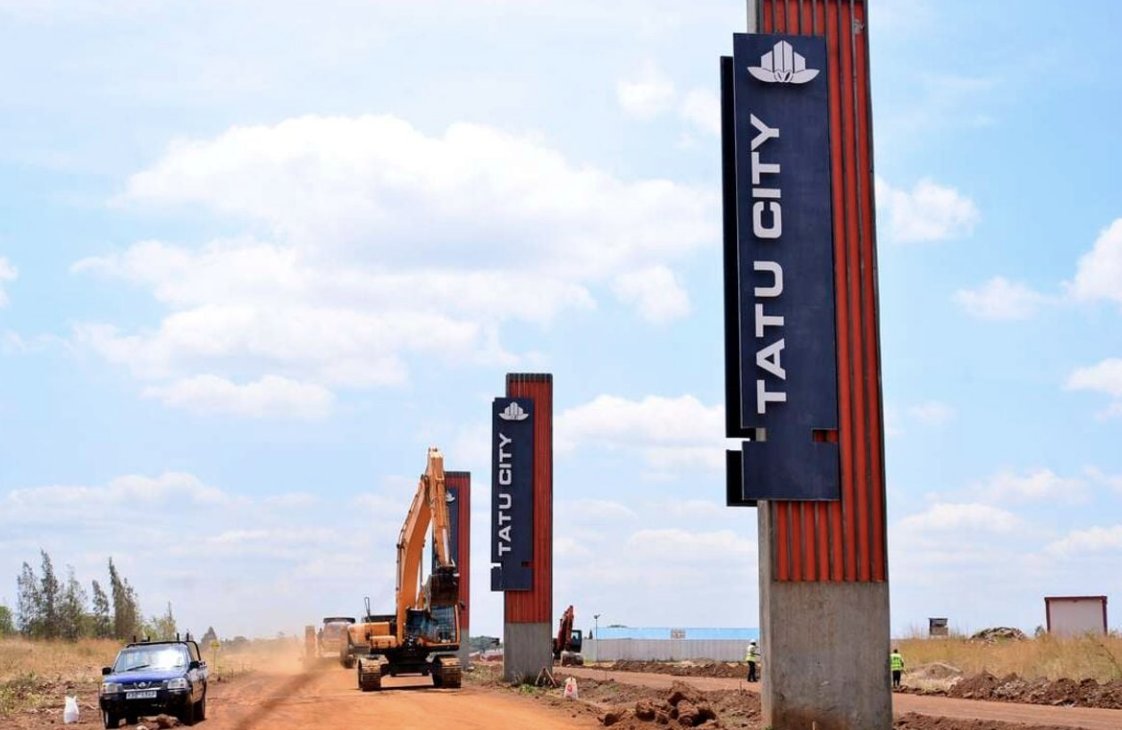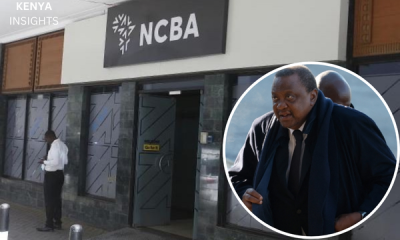Business
Tatu City Wars: Inside Story Of Tax Evasion, Money Laundering Probes
Published
8 months agoon
By
Agencies
- Investigations by law enforcement agencies and bitter parting of ways with a former CEO have all triggered court cases.
- In other instances, Tatu-City affiliated companies are allegedly incorporated offshore to shield them from taxes.
On May 16 directors of Green Seal Properties Ltd and Zefus Properties Ltd recorded statements with the Directorate of Criminal Investigations (DCI), following summons related to tax evasion and money laundering allegations probes.
The DCI’s economic and commercial crimes unit has for months been investigating Green Seal Properties, Zefus Properties and several other companies associated with the Tatu City project for alleged money laundering and tax evasion.
Court papers filed by firms under the Tatu City umbrella, and the DCI, have shone a spotlight into several happenings around the multibillion-shilling project, which has been plagued by several allegations made in different legal battles.
Tatu City is fighting many a battle as shareholder wars, investigations by law enforcement agencies, disputed taxes, fallouts with some of its own clients, exchanges with Kiambu County and bitter parting of ways with a former CEO have all triggered court cases.
By the time Green Seal Properties and Zefus Properties were summoned in May, officers from two elite units of the DCI – economic and commercial crimes, and transnational organised crime – had interacted with the Tatu City investigation file.
The transnational organised crime unit is now in charge of the probe, as the DCI initiates mutual legal assistance from Mauritius and Bermuda, in the hope that owners of the Tatu City project left behind breadcrumbs which can be used as evidence in potential prosecutions.
In its court filings, the DCI states that it intends to also prosecute some officials of the Lands ministry and Kenya Revenue Authority for abetting the alleged tax evasion and money laundering scheme.
In May, detectives sought to hear from directors of the two companies on land transfers involving related entities under the Tatu City project as they put together a file that will be sent to the Director of Public Prosecutions once the investigation is completed.
In the course of their fact-finding mission, detectives believed they had stumbled into instances of document forgery and misrepresentation of facts, all part of the alleged scheme to launder money and dodge the taxman’s dues.
A month later, directors of Meteor Properties Ltd, Gunga Properties Ltd, Jojoja Properties Ltd and Purple Saturn Properties Ltd also received DCI summons. Their directors snubbed the summons.
The six companies cited by the DCI are all related to the Tatu City project, and are special purpose vehicles that were incorporated as part of the mixed-use development which sits on 5,000 acres in Ruiru, Kiambu County.
On Friday, an officer close to the investigation confirmed that the DCI has filed a new application at the Chief Magistrate’s Court, this time seeking access to bank accounts operated by companies under the Tatu City project and their officials.
Detectives want permission to obtain documents related to account opening information, signatories, bank balances, statements showing flow into and out of the accounts and other details they believe may aid the investigation.
The Tatu City project has made some gains since its backers hit the ground in 2008 through real estate firm Rendeavour, most notably being accorded special economic zone status in 2017.
Over the years, nearly 60 companies cutting across the corporate sector, real estate, manufacturing, hospitality and other industries have invested in the project either through land purchases or setting up premises within Tatu City.
The DCI’s working theory is that in particular instances, a Tatu City affiliate acquires land from a related company at a pittance of the market value, lowering its tax liability.
In other instances, Tatu-City affiliated companies are allegedly incorporated offshore to shield them from taxes arising from land purchases.
“Information and details of the documents believed to be in the custody of the respondents herein are crucial documents that will be used as exhibits to investigate the alleged offences of forgery, illegal dilution of shares, asset stripping, money laundering and tax evasion from proceeds of sale of these parcels of land,” DCI investigator Julius Mateh says in his affidavit.
The sale proceeds are allegedly shipped to offshore bank accounts, with Mauritius and Bermuda being some of the preferred destinations.
After directors of Meteor Properties Ltd, Gunga Properties Ltd, Jojoja Properties Ltd and Purple Saturn Properties Ltd snubbed the DCI summons, detectives filed an application before the Kahawa Law Courts Chief Magistrate, seeking authority to cart away dozens of documents.
Proxies to hold shares
Sale agreements between related firms that dealt in land, valuation reports for the properties, receipts, tax-related documents, loan paperwork and company ownership records were the subject of the application.
The DCI also sought to be supplied by Lutta & Company Advocates, and carry away as exhibits, certified copies of the agreement of sale between Kofinaf Company Limited and Jomo Kenyatta University of Agriculture and technology (JKUAT), sale agreement between MJS Mansion Mauritius and Wanachuo Investment Limited and Dexamide Properties Ltd, in respect share purchase and a parcel registered as LR No.10877.
The DCI argued that Galba Mining Limited was incorporated by Kofinaf Company Ltd, one of the main Tatu City affiliates, and became the majority shareholder in Purple Saturn, thus holding its shares as a proxy of Kofinaf Company Limited.
The DCI affidavit alleges that this arrangement was well known to Nahashon Nyagah who, together with former Kofinaf and Tatu City Ltd CEO Lucas Omariba allegedly undertook to procure proxies to hold shares in trust for Galba Mining Limited.
A principal magistrate granted the orders sought by the DCI on August 9.
By the time the companies were being served with the court orders, Green Seal Properties and Zefus Properties Ltd had overhauled their boards, and directed that any communication from the DCI be directed to their advocates, Anjarwalla & Khana.
A week later, 10 companies under the Tatu City roof, and a law firm filed an application before the same court, seeking to quash the orders granting the DCI access to the volumes of documents.
Meteor Properties, Gunga Properties, Green Seal Properties, Zefus Properties, Splendor Investments, Jojoja Properties, Kofinaf Company Ltd, Tatu City Ltd, Purple Saturn Ltd, Daykio Plantations and Lutta & Company Advocates claimed that the orders had been sought through underhand tactics.
The 11 applicants claimed that they were not aware of the investigations and that the DCI did not serve them with the court orders allowing detectives to cart documents away from their offices.
The DCI has responded to the application, filing evidence that the companies were not only informed of the investigations through summons, but that former directors of Green Seal Properties and Zefus Properties tagged their lawyers along for recording of statements at Mazingira Complex in May.
The DCI added that it served the Chief Magistrate’s order on the companies.
The Chief Magistrate’s Court is yet to determine the application by the Tatu City firms.
It is the second time that companies under the Tatu City umbrella are trying to wriggle out of tax evasion and money laundering investigations through the courts.
In April, 2022 High Court judge Esther Maina dismissed a case by Tatu City Ltd and Kofinaf Ltd seeking to block a similar probe by the Ethics and Anti-Corruption Commission (EACC).
The EACC in 2017 initiated an investigation, as it believed that the Tatu City project was being used to facilitate a form of money laundering called loan back scheme.
In that scheme, EACC’s probe indicated that some of the Tatu City affiliates had acquired loans from other related companies to conduct the land transactions.
The loans and land purchases, the EACC investigation found, seemed to be paper transactions, intended to make the companies look like they were doing legitimate business, a pattern often seen in money laundering schemes.
The EACC investigation is still ongoing.
Kofinaf Company Ltd, one of the Tatu City owners, is currently battling a Sh656.7 million tax claim from the KRA at the High Court.
The disputed taxes are in relation to income tax from land dealings in Tatu City for the years 2014 and 2015.
Kofinaf in 2016 filed its tax returns, which included capital gains on land it had sold. The company then wrote to the KRA claiming that it had erroneously included capital gains tax in its books for five pieces of land sold.
In those transactions, Kofinaf had sold land to other Tatu City affiliates – Noir Properties, Gunga Properties, Purple Saturn Properties and Jojoja Properties.
Kofinaf insisted that the land transfers had been done in 2013, two years before capital gains tax came into effect.
But the KRA in response rejected the claim on July 10, 2017, holding that there was no documentation filed to support Kofinaf’s request to amend its tax returns and remove the capital gains references.
Dismissed the appeal
This opened the door for a Sh487 million claim, which was still rising on account of interest and penalties.
Kofinaf filed an objection to the tax claim. Other tax demands and payment reminders were issued to Kofinaf as the objection was pending. The company objected to the further demands.
On May 2, 2023 the Commissioner for Domestic Taxes rejected Kofinaf’s request to amend the 2014-2014 tax returns. The amount had now grown to Sh564.8 million.
Kofinaf objected again, and the KRA rejected again.
Kofinaf challenged the decision at the Tax Appeals Tribunal in August, 2023. The tribunal in April, 2024 dismissed the appeal.
Kofinaf has now filed an appeal against that decision at the High Court, with the amount ballooning to Sh656.7 million.
That includes Sh297.18 million as the principal tax amount, Sh285.3 million in interest and Sh74.3 million in penalties.
The Commissioner for Domestic Taxes dismissed the objection on July 14, 2023.
During a National Assembly investigation into the tax evasion allegations, it was claimed that Tatu City affiliate companies were cooking books to lower their dues to Caesar.
In one instance Stephen Mwagiru, one of the local shareholders that fell out with foreign shareholders, claimed that a piece of land was sold to Jomo Kenyatta University of Agriculture and Technology for Sh842 million.
But Tatu City allegedly declared Sh235 million as the sale price in its books of accounts, effectively lowering tax liability.
A parcel sold to Splendor Investments, allegedly worth Sh2 billion, had its sale price logged in as Sh559 million.
Mr Mwagiru claimed that the Tatu City project had facilitated tax evasion to the tune of Sh1.5 billion.
Nahashon Nyagah, another local shareholder, who is also engaged in court battles with his foreign counterparts told that Parliamentary committee that the tax dodged stood at Sh6.5 billion.
Tatu City maintained that the allegations were bogus, and that Mr Nyagah and Mr Mwagiru were bent on frustrating the multibillion-shilling project.
The Parliamentary petition seeking sanctions against Tatu City and its affiliates was dismissed.
Mr Nyagah is among the local partners who have been engaged in court battles with foreign nationals who are also directors in Tatu City and its affiliate companies, since 2015.
Mr Nyagah, Mr Mwagiru and Bidco Group chairman Vimal Shah were among local partners in the Tatu City project. Mr Nyagah and Mr Shah were minority shareholders.
Mr Shah and Mr Nyagah sued their foreign counterparts Stephen Jennings (New Zealand), Frances Holliday (UK), Hans Jochum Horn (Norway), Frank Mosier (US) and Christopher Barron (New Zealand) in 2015 to block their removal from the project and its operations.
They also sued two local partners, Pius Mbugua Ngugi and Anthony Njoroge, who were on the other side of the fence.
A series of allegations and counter allegations have since been made in that and other cases pitting the two sides. The cases are still pending determination at the High Court in Nairobi.
Mr Nyagah’s camp claims that the foreign shareholders are engaging in tax evasion and money laundering. The foreign shareholders claim that their local partners intended to defraud Tatu City of large land parcels worth billions.
The foreign shareholders have countersued, accusing even lawyers and associates of Mr Nyagah and Mr Shah of aiding fraud against Tatu City and its affiliate companies.
Lucas Omariba, who was Tatu City CEO when the ownership battles begun, is now one of the respondents in the countersuits.
He was sacked in 2015 for alleged insubordination and making negative comments against Tatu City directors.
His termination letter did not indicate the reasons for sacking, which saw Mr Omariba bag a Sh27.5 million windfall for wrongful dismissal after suing Tatu City.
Tatu City ecosystem
Tatu City filed a counterclaim against Mr Omariba, which was dismissed, accusing him of sharing confidential information with third parties after being sacked. Mr Omariba was ordered to either return a Tatu City-issued mobile phone and laptop or pay the company half the purchase price of the two devices.
Justice Onesmus Makau’s 2021 judgment came as another Tatu City friend turned into a foe.
Former Kiambu governor William Kabogo sued four companies under the Tatu City umbrella in 2021, seeking to enforce a sale agreement for 100 acres valued at Sh3.4 billion.
Mr Kabogo sued alongside Gilulu Investments Ltd and Acres and Homes Ltd, seeking to stop Tatu City from terminating the deal, which had seen him pay a Sh348 million deposit in 2016 when still serving as governor.
The politician described Stephen Jennings as the controlling mind of the Tatu City ecosystem, as Chris Barron plays an executive function in the project.
Mr Kabogo claimed that Mr Jennings and Mr Barron requested him to incorporate a company in another country and use it to purchase the land by making payments to a Bermuda-registered Tatu City affiliate called West African Real Estate Holdings.
The former governor said in court papers that he rejected the move to avoid trouble with the KRA over possible tax evasion.
His Acres and Homes paid the deposit. Fundamental Property Ltd, another Tatu City affiliate, issued a termination notice to Mr Kabogo’s former advocate Mary Chege, who then transmitted the document to her client.
Despite being listed by a defendant by Mr Kabogo, Ms Chege is registered as an official of Gilulu Investments, one of the plaintiffs.
Gilulu Investments is registered in Seychelles.
In response to the suit, the Tatu City affiliates filed objections seeking to have the matter referred to arbitration in line with the sale agreement.
Ms Chege filed an objection to being listed in the suit, and later attempted to switch advocates representing Gilulu Investments. She had intended to have Gilulu Investments switch sides and support the Tatu City affiliates. The suit is still pending final determination.
When asked about some of the allegations made by investigative authorities, which are serious and transnational in nature, particularly in regards to asset stripping, forgery and tax evasion, Preston Mendenhall, Group COO Country Head, Kenya Rendeavour came out guns blazing; “Your questions resemble the narrative they regularly peddle to journalists about Tatu City. It’s quite old material actually, covered ad nauseum by NMG for years … with no proof whatsoever.”
With the Kabogo suit still ongoing, Tatu City has been entangled in fights with some of its clients.
Justice Grace Kemei on October 6 allowed Home Bridge Ltd to proceed with its construction of 652 apartments in Tatu City, after lifting a stop order initially issued against the developer.
Tatu City sued Home Bridge in 2023 at the Thika High Court, through Ahmednasir Abdullahi Advocates, arguing that Home Bridge did not get building approvals from Tatu City before embarking on the development project.
Justice Kemei lifted the stop order after Home Bridge argued through Iseme, Kamau & Maema Advocates that it sought approvals from the Lands ministry and Kiambu County only following frustration from Tatu City that culminated in an allegedly exorbitant fee demand.
Tatu City had demanded Sh46 million before issuing approvals, while the two government institutions charged Sh7 million.
Home Bridge Ltd filed evidence that Tatu City was copied in the applications for the approvals, and ensuing feedback from the Lands ministry and Kiambu County.
On account of that evidence, Justice Kemei said Tatu City could not claim that Home Bridge Ltd commenced construction without the necessary building approvals.
“The court finds that the defendant (Home Bridge Ltd) commenced construction after seeking and obtaining approval from the minister. The claim therefore that the defendant was developing the unit without approved plans is untenable. It is not disputed that the plaintiff (Tatu City) was involved in the process of approval undertaken by the Director (of Physical Planning, Ministry of Lands),” Justice Kemei said in her ruling.
Tatu City has filed a notice of appeal to challenge Justice Kemei’s ruling, even as the HIgh Court case is yet to get a final determination.
The firm insists that its approvals were a priority, and that construction could not start before Tatu City’s green light.
Home Bridge borrowed Sh2 billion from a local bank for its project and the stop order risked piling idle fees – penalties for construction delays caused by the contracting party – levied by different contractors it hired for the project.
Tax evasion and money laundering
Just six months earlier, Home Bridge scored another court victory against Tatu City.
In that case, Tatu City Ltd and Tatu Connect SEZ Ltd sued Home Bridge at the Chief Magistrate’s court in Ruiru, seeking Sh10 million in service charge.
Tatu City claimed that Home Bridge had defaulted on service charge since 2016, and that the amounts due had grown to Sh10 million, inclusive of penalties.
Home Bridge in its defence argued that service charge was to be levied by a property owners association, which had not been made operational when it was slapped with the Sh10 million demand.
The real estate firm also raised issue with some items in the billing, and questioned the process used in determining the amount of service charge to be paid by occupants in Tatu City, especially because there was no documented formula.
An audit report of the service charge levied was conducted, but not availed to Home Bridge.
A meeting requested by Home Bridge failed to resolve the standoff, and Tatu City sued.
Chief Magistrate Joseph Were dismissed Tatu City’s case.
The magistrate in his judgment found that the property owners association had not been made operational, and cast doubt on Tatu City’s authority to assess and levy the service charge.
The magistrate added that if assessment of service charge was to be done, then property owners should have been involved in the process.
Mr Mendenhall fell short of explaining how the cases that border shareholder wars, the tax evasion and money laundering investigations by EACC and DCI, the labour court matters, the cases against some clients; and the allegations made in them have affected the uptake of the project in terms of attracting blue chip firms and land sales, and instead chose to intimidate and stalk the journalist with unveiled threats.
He rubbished our queries, instead choosing to malign NMG’s commercial department; “…If things are so dire at Tatu City, why does the NMG marketing department flood us with requests for commercial partnerships? Might that be because Tatu City is successful?”
Kenya Insights allows guest blogging, if you want to be published on Kenya’s most authoritative and accurate blog, have an expose, news TIPS, story angles, human interest stories, drop us an email on [email protected] or via Telegram
📩 Got a Tip, Story, or Inquiry? We’re always listening. Whether you have a news tip, press release, advertising inquiry, or you’re interested in sponsored content, reach out to us! 📬 Email us at: [email protected] Your story could be the next big headline.

You may like
-


Investigation Reveals How Innocent Kenyans Are Unknowingly Trapped in Debts in Shocking KRA Tax Fraud Racket
-


Tatu City: Kenya’s Business Oasis Fights Off Million-Dollar Extortion Schemes!
-


Tax Evasion Scandal Rocks Eldoret Airport: Smugglers Sneak Millions in Smartphones Past Corrupt Officials
-


Uhuru-Linked Bank: Court Quashes Tax Exemptions for NIC-CBA Merger, Preventing Sh7B Tax Evasion
-


State Links EIS Afrika Group to Complex Criminal Syndicate in Multi-Million Shilling Money Laundering Scheme
-


EXCLUSIVE: British American Tobacco Kenya Exposed Over Missing Sh9.6 Billion in Tax Evasion

Court Blocks Automatic Absorption of Ex-NHIF Staff into SHA

DCI Summons MP Allied to Gachagua Over Saba Saba Chaos

Embattled DIG Lagat Hires Top Lawyer As He Eyes Return To Office

Inside Raila’s 1,880 Member Intergenerational Conclave To Begin in August

Ahmednasir’s Law Firm Caught Up in the Middle of Zakhem’s Debt Row

My Husband Was a Pastor in Church, But a Demon to Us at Home

‘Ruto ni Tutams We’ll Rig If We Have To’: Fatuma Jehow’s Shocking Admission Sparks Electoral Integrity Firestorm

National Irrigation Authority CEO Charles Muasya On The Spot Over Tender Irregularities

Adani Whistleblower Nelson Amenya Lifts Lid on Scandalous Sale of Kipini Conservancy

KUCCPS Opens Transfer Window for 2025/2026 Students Seeking Programme Changes

From Billionaire to Broke: The Fall of Humphrey Kariuki’s Empire

How NCBA Software Engineer Opened Floodgates For Mobile Banking System Fraud

Investigation Exposes Alleged Sex Crimes at Alliance Girls High School Amid Institutional Cover-Up

EXCLUSIVE: How Corruption and Mismanagement Have Brought Kenyatta National Hospital to Its Knees

Housing PS Charles Hinga Entangled in Sh 2B Tender Scam

WATCH: New CCTV Footage Reveals Police Brought Ojwang to Hospital Already Dead

Inside the Kibaki Estate Dispute: Power, Bloodlines & the Unfolding Legal Drama

Details Emerge In How ‘Death Squad’ Hatched Plan To Keep Dark Ojwang’s Interrogation Secret in Cell Ending in Death

Former PS Warns of Hidden Hand Behind Mwaura’s Sh1.6B HF Group Acquisition, Predicts Delisting

Police Officer Who Shot Mask Hawker During Protests Arrested
Most Popular
-

 Investigations1 week ago
Investigations1 week agoInvestigation Exposes Alleged Sex Crimes at Alliance Girls High School Amid Institutional Cover-Up
-

 Grapevine2 weeks ago
Grapevine2 weeks agoCS Alfred Mutua Embroiled in Custody Battle After A ‘Quick’ Moment With Kenyan Girl in Dubai
-

 News2 weeks ago
News2 weeks agoOle Kina Fragrance Sets Kenyan Market Abuzz with Million-Shilling Expansion
-

 Americas1 week ago
Americas1 week agoHow A Nigerian Yahoo Boy’s Elaborate Plan to Scam Trump Backfired As FBI Goes After Him
-

 News1 week ago
News1 week agoIrony of Lydia Mathia Seeking Court Interventions Months After Calling Court Orders ‘Mere Papers’ While Spearheading Evictions
-

 Politics5 days ago
Politics5 days agoMoses Kuria Resigns from Kenya Kwanza Government
-

 News2 weeks ago
News2 weeks agoOutrage as Kenya Agrees to Buy Defence Equipment From UK in Ksh12.5 Billion Deal
-

 Business5 days ago
Business5 days agoCourt Freezes Kenya’s Afriswiss Commodities Bank Account in Alleged Gold Fraud